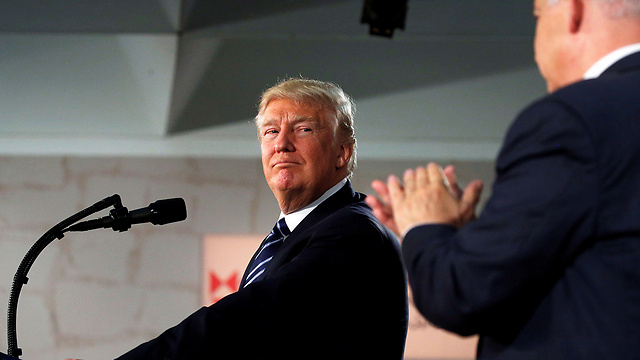Op-ed: The US president used his Mideast visit to sell stuff—and he was very successful. He turned Saudi King Salman into his personal hero, and offered the Israelis sympathy. The Palestinians didn’t even get a right to self-determination, but Trump is such a good salesman that even they are satisfied.
Like at the end of an evening with too much alcohol, US President Donald Trump took off and left behind a deep feeling of emptiness. All we are left with are the memories, and they too are fading away.
es, there was a Zionist and pro-Israel speech at the museum, in front of the elite of the current Israeli government. It was so pleasant, that when Prime Minister Benjamin Netanyahu stood up and applauded the president in the middle of his speech, he felt it wasn’t enough and added an enthusiastic clenched fist gesture as well.
The power of speech, however, was in the things the American president didn’t say: He didn’t speak about two states for two people, didn’t discuss the Palestinians’ right to self-determination, avoided any mention of a territorial compromise and reiterated the American commitment (from the George W. Bush and Barack Obama eras) that Iran would not obtain a nuclear weapon.

On the other hand, there was no deep recognition of the Jewish people and State of Israel’s historical connection to Jerusalem either. There was definitely no declaration of Jerusalem as Israel’s capital, and mum’s the word when it comes to the chance that Trump would move the US embassy to the capital. It’s perfectly clear that storming the hills and building in all parts of Judea and Samaria is out of the question as far as the Trump administration is concerned.
The Palestinians were satisfied. When Trump took office, they were told by the Israeli right-wing that the American embassy would soon be moved to the Old City and that Yitzhar would be annexed—and voila, the dream has evaporated. The Israelis were thrilled: Finally, a president who loves us and doesn’t preach and only talks about the Israeli children who run into shelters, without saying a word about Palestinian children, like that party pooper Obama.
Anyone who is familiar with the Trump empire’s business model knows that its core business is sales. Trump sells a dream, a brand he worked on his entire adult life. From a golden penthouse to eating a Big Mac on a private plane, the American president has dedicated his life to building an image and then making profits out of it: Franchises and management of holiday resorts, golf, steaks and apartments.
In his visit to the Middle East, Trump sold and sold—and very successfully. Saudi King Salman became the American president’s personal hero. He is mentioned in every meeting and speech thanks to his supreme wisdom and intelligence, along with a promise to heat up the Iranian front. Music to Riyadh’s ears. And Trump? He won contracts of more than $100 billion.
The Israelis received a lot of warmth for Netanyahu, sympathy towards the Israeli situation and an important visit to the Western Wall. Through his visit to the region, Trump dealt with the deep animosity in his political base in America towards Saudi Arabia and the Saudis. The Palestinians got the least, not even a right to self-determination. That’s the way it is in business. They are the smallest and weakest creatures. But Trump is such a good salesman, that even they are satisfied.
There is a huge gap between sales and life itself. Real negotiations require a firm desire on both sides, a willingness to take political risks, imagination and resourcefulness. If you think Netanyahu and Palestinian President Abbas have been endowed with these qualities, you’re welcome to be optimistic.
And there’s Trump. Remember that the audience which greeted him at the Israel Museum on Tuesday admired George W. Bush as well. For his determination to bring democracy to the Middle East, for his decision to invade Iran. They were completely in love with Bush, turning a blind eye to the fact that Israel paid the price in the Palestinian Authority elections in which Hamas rose to power, in Iraq’s disintegration, in laying the foundations for the Arab Spring and in the emergence of the Islamic State.
A more cautious Israel would have warned Trump that the Saudi sword dance with Iran could drag him into a war, complicate the Syrian situation and fail to lead to real battle against the radicals. But it’s hard to restrain Trump, and a cautious Israel is nowhere to be found anyway.
As reported by Ynetnews
